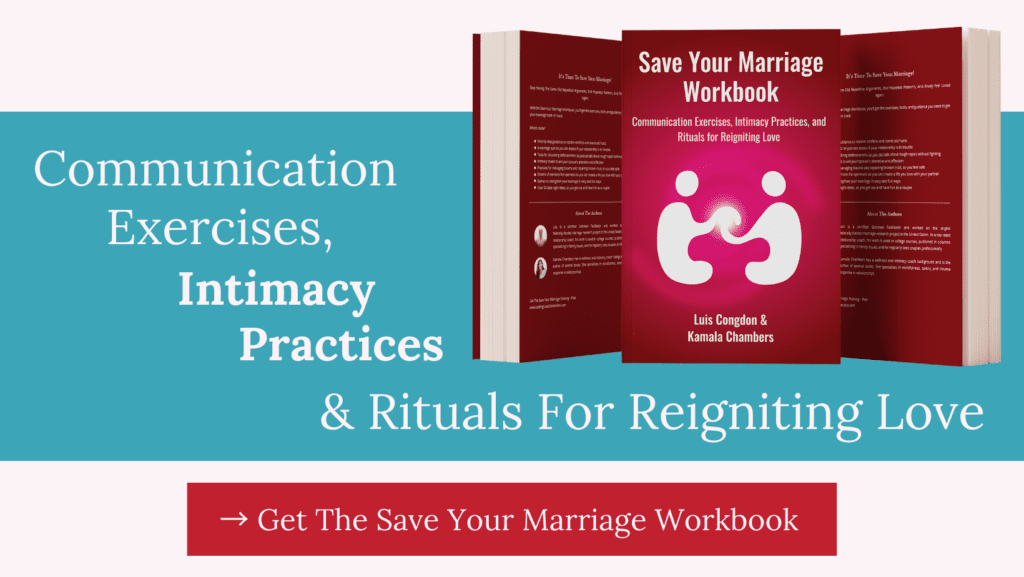Are you asking yourself, “What to do if my husband yells at me?”
If your husband is yelling at you, it can feel extremely distressing, confusing, and hurtful.
If your partner is threatening you while yelling, this is one of the many things that can destroy a marriage and worsen your mental health and self-esteem.
I know you likely want to save your marriage and work things out.
Therefore, I’ve put together this guide to help you learn how to respond if your husband is yelling at you.
Table of Contents
Why does my husband scream at me?

When asking yourself, “Why is my husband always shouting at me?” know that this behavior is not okay.
If this behavior is frequently happening and accompanied by other threatening behaviors, you are possibly experiencing verbal and emotional abuse.
Just as we would advise men in relationships with wives who yell, please consider the severity and ask yourself if you two would benefit by speaking to a mental health professional.
To know if you’re in an abusive relationship or experiencing verbal abuse, ask yourself
- Do I feel safe in my relationship?
- Do I experience name-calling?
- Does he recognize his harmful behavior or not care how his yelling makes me feel?
- Do I feel scared, isolated, and disrespected most of the time?
- Am I walking on eggshells to keep my husband in a good mood and avoid setting off his short temper?
- Does my husband listen to me,or does he gaslight me when I speak?
- Do you avoid talking about sensitive topics out of fear your husband will become verbally aggressive?
What does it mean when my husband yells at me all the time?

In some cases, a husband’s yelling may be a response to a fight, flight, freeze, or fawn reaction.
Some people react by fighting when their nervous system becomes dysregulated (such as in an emotional argument).
In turn, they feel trapped or overwhelmed, causing them to yell.
Although yelling is not a healthy response to any situation, it doesn’t always indicate emotional abuse if repetitive and severe behaviors don’t accompany it.
Finding ways to help your husband and yourself stay calm during the stress you experience can strengthen your bond and help you grow together.
What to do if my husband screams at me and hits me?

If you’re thinking, ‘My husband screamed at me and hit me,’ know that this behavior is not acceptable.
It is important to note that if you are experiencing physical violence or fear for your life or safety, you should leave the situation as soon as possible.
Call 911 if you are in danger.
You can also reach out to the National Domestic Violence Hotline at 800.799.SAFE (7233) at any time.
This is advice we give to both men and women experiencing physical abuse.
How to respond when my husband yells at me?
If you’re asking yourself, “What to do if my spouse yells at me or my husband cusses at me,” there are several ways to address the situation.

If your husband frequently yells at you, it’s normal to feel afraid or upset.
It’s possible your husband’s yelling makes you feel worthless.
You may even wonder if your husband still loves you.
It’s essential to address your concerns with your husband when you both feel calm and can speak to each other kindly.
We call this the window of tolerance.
It’s a mindset that allows you to remain calm and listen to someone else’s point of view, even when feeling difficult emotions.
For this to work, you and your husband must feel safe.
Further, neither of you can be active in the fight, flight, freeze, or fawn response, which means your nervous systems are dysregulated.
4 strategies when my husband yells at me
- Walk away from escalated arguments and come back to them later.
- Set boundaries with your partner when you need space.
- Work on regulating your nervous system with mindfulness practices and coaching.
- Return to a discussion only when you feel safe and ready.
You and your husband should come into the conversation with a refreshed mind, feeling loving towards each other.
With the desire to make a change, you can end arguments and reduce the chance of trauma bonding or a codependent relationship.
What if my husband keeps yelling at me and doesn’t think it’s wrong?

If your yelling husband doesn’t think he’s doing anything wrong or refuses to make changes or work with you, you may wonder what to do.
Perhaps your yelling husband is passive-aggressive when you try to bring it up or refuses to change his behavior.
In this case, you have a significant decision to make.
You can’t make your husband stop yelling.
All you can do is continue to express your concerns and work to get help.
Additionally, consider how you can shift your own behavior.
You can also set a boundary for yourself and let your husband know you will not speak to him if he immediately becomes defensive or raises his voice.
Walking away from an escalated situation can give you and your husband time to calm down and think about what is happening.
My husband yells at me: seek professional support
Remember, however, that constant yelling is verbal abuse.
It’s not up to you to “fix” or “console” your husband if they act abusively toward you.
Regardless of what makes your husband yell, it is not okay- and it’s not your fault.
If your husband has difficulty understanding their behavior, it’s sometimes best to try couples counseling.
Counseling sessions will help you and your husband express your desires and feelings in a safe environment.
A relationship coach can also provide critical coping skills that you can use for years to come.
If you’re ready, you can book a complimentary consultation today with an online marriage counselor.
In this video, I talk about warning signs your relationship is in trouble and what you can do.
What if my husband yells at me a lot and wants to change his behavior?
If your husband feels terrible about his behavior and wants to change, consider talking to him about the window of tolerance and the fight, flight, freeze, and fawn responses that can take over our bodies and minds.
The responses look like this:
- Fight: Yelling, acting aggressively, not letting the conversation end, wanting to “fix” things, making big gestures, or moving the body quickly.
- Flight: Running away, ignoring messages, staying silent, wanting to avoid a conversation, crying to remove responsibility, feigning helplessness.
- Freeze: Becoming silent, ignoring you, stonewalling, being unable to “think” or “process,” being unable to move or leave the room.
- Fawn: Going on autopilot and doing whatever the other person wants to avoid conflict.

Try filling out the window of tolerance worksheet together by going through the Save Your Marriage Workbook.
We have expertly crafted the exercises to help you identify the root cause of conflict and stop yelling and reactivity.
In a relationship with frequent yelling, it’s common to feel disconnected from your partner.
In the Save Your Marriage workbook, you’ll learn good marriage communication skills to feel connected again.
As a relationship coach and marriage expert, I have seen over a thousand couples who believed they could no longer fix their relationship.
They, too, asked, “What to do if my husband constantly yells at me and I can’t fix it?”
While change doesn’t happen overnight, it is possible to make your husband stop yelling and move toward a loving and healthy relationship.
Remember, there is always hope, and you’re not alone in your struggles.
With help, you will no longer need to ask, “What to do if my husband yells at me for everything?”
There’s no shame in admitting you need to change, so take the first step today with the Save Your Marriage Workbook.

Why does a man yell at his wife?
A husband yells because he lacks emotional control to express his frustration or anger in healthier ways. Relationship problems, as well as external stressors like financial problems, can contribute to a husband’s yelling. Moreover, if a husband grew up in a household where angry outbursts were common, it is more likely that he will exhibit such behavior in his own marriage. Regardless of what makes your husband yell, his behavior is not okay.
Is yelling toxic in a relationship?

Yes. When it is frequent and severe, yelling is a form of emotional abuse. When a husband yells, it damages trust, communication, and intimacy in the relationship. If you are experiencing domestic abuse, contact the National Domestic Violence Hotline to speak with a domestic violence counselor and receive support.
What are the effects of being yelled at by your spouse?
When husbands yell at their wives, it can have a significant and negative impact on their mental health and well-being. It can result in negative emotions (such as fear and helplessness), low self-esteem, chronic stress and anxiety, and a breakdown of trust in intimate relationships. On the receiving end of yelling, many wives feel upset, scared, and unloved in their marriages.
How do you deal with someone who yells at you?
Use these strategies to cope with your husband’s yelling: 1.) Stay calm. 2.) Set ground rules for the behavior you will and will not tolerate. 3.) If you feel unsafe during an argument, leave the room. 4.) Take cooling off periods when the conversation gets heated. 5.) Seek couples therapy to improve communication and learn healthy ways to resolve conflict together.






My husband yelled at me for asking that he get happy meals because his mom cooked for them without my knowledge.. he said I was going to pay for those happy meals. I don’t know if I am more upset about him yelling or that he did it in front of his mom and then went on to socialize with her as if nothing had happened.
Both actions sound immensely hurtful. To be yelled is never good. In private or with others, being yelled has negative affects on our nervous system (heart rate increases, we feel unsettled and elevated, and we feel upset and hurt that our partner talks to us with disrespect). Then to have someone act as if nothing happened just adds more to the insult. I am curious, have you talked to him about this incident? I hope you two make time to kindly address this problem. It might as simple as, “hey honey I need to talk to you about what happened the other day.” Then staying focused on the topic, and ideally with permission to engage (which you deserve and you two will want to create space to talk). From there, staying focused being able to say, “the other day you yelled at me in front of your Mom and it really upset me to be yelled at, and to have it done in front of others just makes me feel even worse. I’d like to ask you don’t yell at me.” If you two can engage in this conversation and do what is called Repair, the act of revising a moment when we were hurt to listen and understand each other, then you’ll be able to move forward with a healthier relationship. Many couples don’t tend to repair, and that always turns into bigger problems down the line.
Read this.
https://lastingloveconnection.com/what-do-i-do-if-my-wife-yells-at-me/
Same webpage.
It is concerning that the assumption is that there are serveral valid and understandable reasons for a woman to yell at her husband. In contrast, the opossite is a matter of serious concern.
We always appreciate the feedback. Understandably these are difficult topics – yelling, knowing when yelling is abusive, and trying to advise readers to decide if the yelling is abusive or something they can work on together. If. yelling is present; we always suggest getting help. In both articles, we suggest that if you are a man or woman, if you don’t feel safe or worry that it’s abusive – try calling the domestic violence hotline. Similarly, in both articles, we say yelling is harmful and creates more problems. If you have specific tips on how we can improve either article, please do let us know. We have tried to be caring and careful in the input and advice we give. If you need further, please reach out to us or try calling a local therapist/counselor.
My husband yelled at me tonight for tripping and falling. I told him it was an accident and he continued to blame me. This just gets very old!
Completely agree. I slipped on ice and fell. Didn’t get hurt. Was screaming at me for falling and said under his breath”I should just put you in a home.” I’m 50 and active. I pretended not to hear, but I can’t stop it from playing in my head.